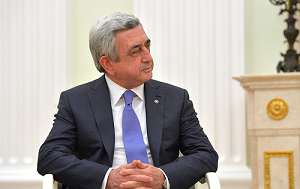Parliamentary Elections in Armenia Ensure Continued RPA Rule
By Armen Grigoryan
June 9, 2017, the CACI Analyst
The outcome of Armenia's parliamentary elections on May 2 suggest a further strengthening of the country's oligarchic system and its dependence on Russia. These are mutually reinforcing, reducing the likelihood of both substantial political reform and the realization of the lucrative opportunities offered by the U.S. and EU. The attitude towards such opportunities largely depends on Moscow's preferences. The fractured and demoralized political opposition remains incapable of mobilizing significant public support. Furthermore, most of the opposition does not question the country's geopolitical orientation and avoids criticizing the government's pro-Russian policies or Moscow's policies vis-à-vis Armenia.

Armenia’s Political Forces Get Ready for Parliamentary Elections
By Armen Grigoryan
March 20, 2017, the CACI Analyst
March 5 marked the start of official campaigning for Armenia’s parliamentary elections, scheduled for April 2, after which a parliamentary system will replace the current presidential one. Yet these elections are unlikely to bring about any significant changes in either the economic and social spheres or in Armenia’s pro-Russian foreign policy, given the dominant position of the ruling Republican Party of Armenia (RPA). The opposition running for election is fragmented and short of resources, and will compete in an election system favoring the RPA.

Karakbakh negotiations on hold as Armenia gears up for parliamentary elections
By Armen Grigoryan
January 12th, 2017, The CACI Analyst
Further negotiations on the Nagorno-Karabakh issue seem to be practically postponed until Armenia completes its parliamentary elections in April 2017. At the same time, the government demonstrates an unwillingness to proceed beyond rhetoric with governance and economic reforms. The administration’s inability to deliver satisfactory economic results and ensure social development, as well as its close connections with Russia with a strong clientelism component, suggest a further growth of dependence and compliance with Moscow’s political agenda.





